|
|
|
|
|
|
|
|
|
No Arctic-science events are scheduled for today.
|
Media
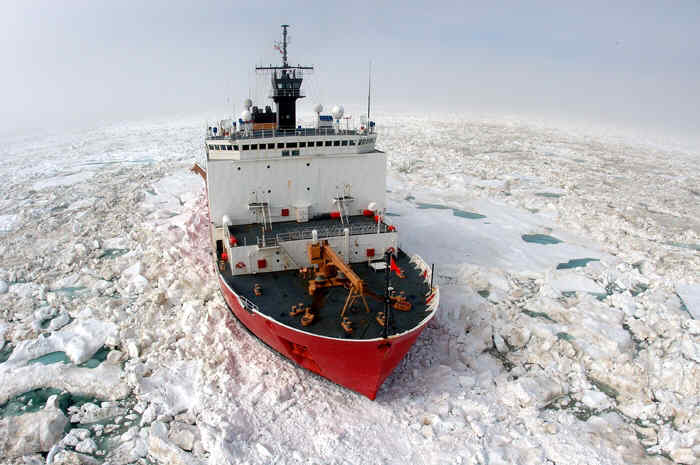 Report: Coast Guard Should Focus on Buying Heavy Icebreakers. Report: Coast Guard Should Focus on Buying Heavy Icebreakers. The Coast Guard wants to buy three heavy and three medium icebreakers, but given the realities of current budget restraints, the service would be better off considering block-buying four ships all of the same design. The need for new icebreakers is not new. At the moment, the Coast Guard has one medium icebreaker, USCGC Healy (WAGB-20), and one aging heavy, USCGC Polar Star (WAGB-10), able to support U.S. interests in the Arctic and Antarctic regions. The hang-up has been convincing Congress to pay for new ships at a time of tight budgets. USNI News
These are Melting Glaciers That Might Someday Drown Coastal Cities, According to NASA. New York City has plenty to worry about from sea level rise. But according to a new study by NASA researchers, it should worry specifically about two major glacier systems in Greenland's northeast and northwest - but not so much about other parts of the vast northern ice sheet. The research draws on a curious and counterintuitive insight that sea level researchers have emphasized in recent years: As ocean levels rise around the globe, they will not do so evenly. Rather, because of the enormous scale of the ice masses that are melting and feeding the oceans, there will be gravitational effects and even subtle effects on the crust and rotation of the Earth. This, in turn, will leave behind a particular "fingerprint" of the sea level rise, depending on when and precisely which parts of Greenland or Antarctica collapse. Alaska Dispatch News
Toxic Algae May Have Played Part in Sea Bird Die Off. Whodunit? That is the question that multiple federal and state agencies are trying to solve to get to the bottom of an unusual seabird die off of multiple species in the region during this summer and fall. A definitive answer is still eluding scientists but clues are pointing in the direction that biotoxins from harmful algae in the Bering Sea may have played a role. Nome Nugget
International Scientific Dialogue in the Arctic. The International Science Initiative in the Russian Arctic (ISIRA) has been working for 25 years. It was established back in 1993 as part of the International Arctic Science Committee (IASC). The leadership of the ISIRA and IASC determined the priority sectors of actions: planning international research programs to resolve key issues in the Russian Arctic; organizing a forum for cooperation in bilateral projects; helping research groups to get access for work in the Russian Arctic; and consulting on finance and project research. The Arctic
 Colder Winter Forecast for Southcentral Alaska, but Warmer in Rural Regions With Shrinking Sea Ice. Colder Winter Forecast for Southcentral Alaska, but Warmer in Rural Regions With Shrinking Sea Ice. Alaskans can expect something of a sequel to last year's winter weather, colder in Southcentral and Southeast but relatively warm in much of rural Alaska where sea ice has melted, a climate scientist said Friday. Those warmer-than-normal expectations - for the Western and Arctic regions - result from big reductions in coastal sea ice in those areas, said Rick Thoman, climate science and services manager for the National Weather Service in Alaska. Alaska Dispatch News
Arctic Climate Change Being Felt Farther South, Scientists Say. An international summary of five year's worth of research on Arctic climate change concludes the top of the world is getting warmer faster than anyone thought. And if it all sounds interesting but a little far removed from southern concerns, David Barber has news for you. CBC News
Added Arctic Data Shows Global Warming Didn't Pause. Gaps in Arctic temperature data caused a misperception that global warming slowed from 1998 to 2012, according to a new study in the journal Nature Climate Change. A University of Alaska Fairbanks professor and his colleagues in China built the first data set of surface temperatures from across the world that significantly improves representation of the Arctic during the "global warming hiatus." Science Daily
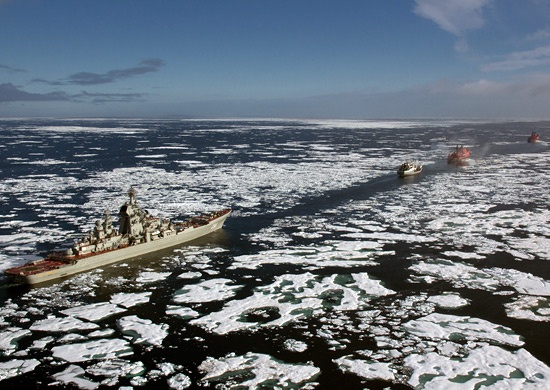 Arctic Routes Are Seasonally Predictable. Arctic Routes Are Seasonally Predictable. The ability is a boon for shipping companies hoping to exploit Arctic routes, which are becoming more accessible due to declining sea ice in the region. In principle, predictions of the opening and closing of the Arctic shipping season can be made as early as January, the researchers found, although there is a step-change to much higher predictability after May. By July, two months before the usual sea-ice minimum, it should be possible to predict the fastest open-water route through the Arctic to within 200 kilometers, the scientists believe. Environmental Research Web
Thawing Mosses Tell a Climate Change Tale. Some mosses in Canada's eastern Arctic have long been entombed in ice. But now, rising temperatures have been melting that ice, bringing those mosses to light. By dating how long ago those mosses were buried, scientists now conclude that summertime temperatures in this region are the warmest they've been in tens of thousands of years. "We were stunned," said Gifford Miller of the University of Colorado Boulder. As a paleoclimatologist, he studies ancient climate. At some sites he studied, the emerging plants last saw the sun no less than 45,000 years ago. Some may have been buried for up to 115,000 years. Science for Students
Scientists Discover Bacteria From Arctic Permafrost Can Withstand Mars-like Environment. Russian researchers have discovered that some bacteria from ancient Arctic permafrost can survive even up to 20 million years in an inactive state under conditions similar to those on Mars. The study of microorganisms was carried out during a joint project dubbed "Noah's Ark", the press office of Ural Federal University (UrFU) reported. "This study is of extremely great value for science, since it allows us to approach the understanding of the survival limits of microorganisms placed in natural substrates under extreme conditions. The scientists from UrFU took part in the molecular-biological analysis of samples to find out the structure of microbial communities," commented Sergey Bulat, senior laboratory research assistant at the Extra Terra Consortium from the Physics and Technology Institute of UrFU. TASS http://tass.com/science/976616
Transport Ministry to Prepare Alternative Proposals on the Northern Sea Route's Development Agency. The Russian Ministry of Transport will present alternative proposals on which structures are to develop the Northern Sea Route (NSR), TASS reports citing Deputy Minister of Transport Viktor Olersky. He added that this work is being done on the president's orders. "Now we are holding consultations with Rosatom," Olersky said. "This is extensive and complicated work. It's hard to say when it will be completed," he added. The Arctic
|
|
Future Events
Arctic Research Seminar with Courtney Carothers and Laura Zanotti: In a Climate of Change: Co-producing Knowledge and Community Researcher Relationships in the Leadership and Strength Project in Utqiagvik, Alaska, November 30, 2017 (Washington, DC USA). Courtney Carothers is an associate professor of fisheries in the College of Fisheries and Ocean Sciences at the University of Alaska Fairbanks. She is an environmental anthropologist currently researching how fishery systems are being remade by enclosure and privatization processes and the total environment of change facing Arctic Indigenous communities. Her work explores human-environment relationships, cultural values, equity, and well-being. She has co-edited two books and published over 30 articles and book chapters on these topics. She currently serves on a number of boards and working groups, including: the SEARCH (Study of Environmental Arctic Change) Science Steering Committee, the North Pacific Research Board Science Panel, the Alaska Sustainable Salmon Fund Expert Panel, the State of Alaska's Salmon and People. This event is part of the ARCUS DC Arctic Research Seminar Series.
** New this week ** Fleeing Change: Relocation the Village of Newtowk, Alaska, December 6, 2017 (Washington, DC USA). The Wilson Center will sponsor this event. The Village of Newtok, a Yupik Eskimo community of 450, faces certain destruction from slow-moving climate disaster. Coastal and river erosion of the Ninglick River embankment and degradation of the region's underlying permafrost has already destroyed critical infrastructure in the village, including the only barge landing, a solid waste site, and soon freshwater source. Newtok may no longer be a viable community by 2020 and has been working to relocate to Mertavik, a site nine miles up the Ninglick River. This discussion will be with Newtok's leadership on their experiences and struggles to preserve their Yupik way of life on their historic subsistence lands.
AGU Fall Meeting, December 11-15, 2017 (New Orleans, LA USA). Fall 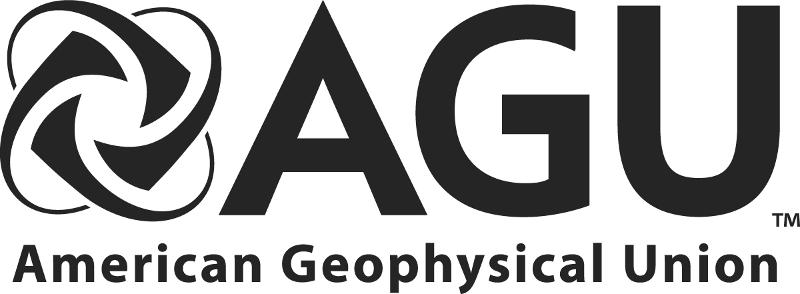 Meeting is the largest and preeminent Earth and space science meeting in the world. The 2017 Fall Meeting will take place in New Orleans, Louisiana, offering attendees the chance to discover a new location that features world renowned cuisine, music, arts and culture, and provides access to vital scientific ecosystems. Fall Meeting will offer a unique mix of more than 20,000 oral and poster presentations, a broad range of keynote lectures, various types of formal and informal networking and career advancement opportunities, scientific field trips around New Orleans, and an exhibit hall packed with hundreds of exhibitors.
ArcticNet invites the global Arctic research community to Arctic Change 2017! This conference will bring together Arctic researchers and students with Inuit, Northerners and government, industry and NGO stakeholders. The world's foremost Arctic scientists will present research findings and discuss impacts of climate change and modernization. With 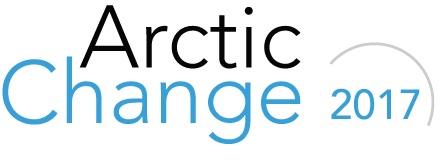 over 1500 participants expected, Arctic Change 2017 will be one of the largest trans-sectoral international Arctic research conferences held in Canada. We welcome students and early career researchers to participate in "Student Day" at the start of the Conference. See an excerpt from last year: ArcticNet ASM2016. over 1500 participants expected, Arctic Change 2017 will be one of the largest trans-sectoral international Arctic research conferences held in Canada. We welcome students and early career researchers to participate in "Student Day" at the start of the Conference. See an excerpt from last year: ArcticNet ASM2016.
Actionable Science: Arctic Research Addressing Stakeholder Needs // AGU Town Hall Hosted by IARPC and SEARCH, December 14, 2017 (New Orleans, LA USA). The Interagency Arctic Research Committee (IARPC) and the Study of Environmental Arctic Change (SEARCH) recognize the importance of science that is actionable by stakeholders. This town hall will share their evolving approaches and engage the community in discussions of best practices and new approaches. Examples of Arctic research addressing stakeholder needs will serve as test cases to examine: how are needs identified; how are questions appropriately framed to meet stakeholder needs; and what promotes and constrains research addressing those needs? The executive directors of SEARCH and IARPC will moderate discussion among SEARCH and IARPC teams and the broader community.
ISAR-5 Fifth International Symposium on Arctic Research, January 15-18, 2018 (Tokyo, Japan).The fifth ISAR has been planned at the recommendation of the science steering committee of ISAR-4, which was held in Toyama, Japan in April 2015. The fifth ISAR will be devoted to discussions on environmental changes in the Arctic and their regional and global implications, to seek additional international scientific collaboration in this area by gathering, synthesizing and sharing information related to these changes occurring in the Arctic. Special emphasis will be placed on the fields of the social sciences and humanities, which were not included in the previous ISARs. ISAR-5 will consist of general sessions and special sessions. The general sessions will address the following topics: atmosphere; ocean and sea ice; rivers, lakes, permafrost, and snow cover; ice sheets, glaciers, and ice cores; terrestrial ecosystems; marine ecosystems; geospace; policies and economy; and social and cultural dimensions. Special sessions will be solicited on cross-cutting themes.
** New this week ** NSF Principles for the Conduct of Research in the Arctic, Comments due January 16, 2018. The Interagency Arctic Research Policy Committee (IARPC), is seeking comments on how best to revise and strengthen the Principles for the Conduct of Research in the Arctic. A Federal Register Notice has been published to solicit community input. Since 1990, community engagement and Arctic research have advanced both in theory and in practice, necessitating a review and update of the current Principles. The Principles Revision Working Group of IARPC is seeking input from all stakeholders to revise and update the Principles. The update will focus on communicating clearly the Principles for community engagement by Arctic researchers and including language that describes partnerships and collaborations with Indigenous scholars, enhanced community-based observations, fostering community-based participatory research, and the integral contributions of Indigenous knowledge in the co-production and dissemination of knowledge. Input is also sought on enhancing the dissemination and implementation of the Principles. Comments can be emailed to iarpcprinciples@nsf.gov. 2018 Arctic Frontiers: Connecting the Arctic, January 21-26, 2018 (Tromso, Norway). Arctic Frontiers is an international arena on sustainable development in the Arctic. The conference addresses the management of opportunities and challenges to achieve viable economic growth with societal and environmental sustainability. Arctic Frontiers brings academia, government and business together to create a firmer foundation for decision-making and sustainable economic development in the Arctic. Join the Arctic Frontiers conference preparing the new Arctic future. The conference takes place the fourth week of January in the Norwegian city of Tromsø, known as the Gateway to the Arctic.
Alaska Marine Science Symposium, January 22-26, 2018 (Anchorage, Alaska.)
The Alaska Marine Science Symposium (AMSS) is Alaska's premier marine research conference. For over 20 years, it has brought together scientists, educators, resource managers, students, and the public to discuss marine research conducted in Alaskan waters. Over 700 people attend this 4-day long conference held annually in January. Each day of the conference highlights Alaskan marine ecosystems: Arctic (Tuesday), Bering Sea & Aleutian Islands (Wednesday), and the Gulf of Alaska (Thursday). Research topics discussed range from ocean physics, fishes and invertebrates, seabirds, marine mammals, to local traditional knowledge. Website for 2018 meeting is here.
Alaska Forum on the Environment, February 12-16, 2018 (Anchorage, Alaska)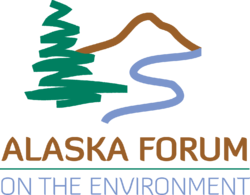 . AFE is a statewide gathering of environmental professionals from government agencies, non-profit and for-profit businesses, community leaders, Alaskan youth, conservationists, biologists and community elders. The diversity of attendees sets this conference apart from any other. The 2018 event will be our 20th year providing a strong educational foundation for all Alaskans and a unique opportunity to interact with others on environmental issues and challenges. . AFE is a statewide gathering of environmental professionals from government agencies, non-profit and for-profit businesses, community leaders, Alaskan youth, conservationists, biologists and community elders. The diversity of attendees sets this conference apart from any other. The 2018 event will be our 20th year providing a strong educational foundation for all Alaskans and a unique opportunity to interact with others on environmental issues and challenges.
** New this week ** 2018 North by North Festival, April 23-29, 2018 (Anchorage, Alaska USA). The North by North Festival captures the spirit of Alaska and the Arctic - to address our challenges and opportunities with Northern innovation and resilience, to build on a rich history and to ensure a future full of promise. The Festival is for the North, and organized by Northerners, with goals of sustainability, livability and growth. The Festival brings innovators from across Alaska, the nation and other Arctic regions to collaborate and address local and circumpolar challenges. Through knowledge, governance, business, design, film, music, food, literature and art, we celebrate the North.
The Effects of Climate Change on the World's Oceans, June 4-8, 2018 (Washington, DC USA). The 4th International Symposium will bring together experts from around the world to better understand climate impacts on ocean ecosystems - and how to respond. The event is hosted by a variety of groups including International Council for the Exploration of the Sea (ICES), N. Pacific Marine Science Organization (PICES), Intergovernmental Oceanographic Commission of UNESCO (IOC), and Food and Agriculture Organization of the United Nations (FAO).
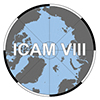
International Conference on Arctic Margins (ICAM) VIII, June 11-14, 2
The international Conference on Arctic Margins (ICAM) is a forum for earth scientists who study the Arctic. It was founded to help understand the little known Arctic geology and to foster cooperation and collaboration among Arctic researchers. There have been 7 meetings since its inception in 1991. See here for more information.
 POLAR 2018, June 15-27, 2018 (Davos, Switzerland).POLAR2018 is a joint event from the Scientific Committee on Antarctic Research (SCAR) and the International Arctic Science Committee (IASC). The SCAR meetings, the ASSW and the Open Science Conference will be hosted by the Swiss Federal Institute for Forest, Snow and Landscape Research WSL under the patronage of the Swiss Committee on Polar and High Altitude Research. The WSL Institute for Snow and Avalanche Research SLF is organizing POLAR2018. POLAR 2018, June 15-27, 2018 (Davos, Switzerland).POLAR2018 is a joint event from the Scientific Committee on Antarctic Research (SCAR) and the International Arctic Science Committee (IASC). The SCAR meetings, the ASSW and the Open Science Conference will be hosted by the Swiss Federal Institute for Forest, Snow and Landscape Research WSL under the patronage of the Swiss Committee on Polar and High Altitude Research. The WSL Institute for Snow and Avalanche Research SLF is organizing POLAR2018.
17th International Congress of Circumpolar Health (ICCH17), August 12-15, 2018 (Copenhagen, Denmark). The ICCH congresses are held every third year in different locations in the circumpolar area and represent the largest scientific meetings worldwide on circumpolar health. The ICCH congresses serve as the primary source of information exchange and scholarly communication in issues relating to circumpolar health. More than 750 participants generally register and participate in each Congress, and more than 400 scientific papers or posters are usually presented.
Arctic Biodiversity Congress, October 9-11, 2018 (Rovaniemi, Finland). The second Arctic Biodiversity Congress is hosted by the Conservation of Arctic Flora and Fauna (CAFF), the biodiversity working group of the Arctic Council, and the Ministry of the Environment, Finland. The second Arctic Biodiversity Congress will build on the success of the first Congress, held in 2014 in Trondheim, Norway, and will bring together scientists, policymakers government officials, Indigenous representatives, Traditional Knowledge holders, industry, non-governmental organizations, and others to promote the conservation and sustainable use of Arctic biodiversity.
|
|

  
4350 N. Fairfax Drive, Suite 510
Arlington, VA 22203, USA
External links in this publication, and on the USARC's World Wide Web site ( www.arctic.gov) do not constitute endorsement by the US Arctic Research Commission of external Web sites or the information, products or services contained therein. For other than authorized activities, the USARC does not exercise any editorial control over the information you may find at these locations. These links are provided consistent with the stated purpose of this newsletter and the USARC Web site.
|
|
|
|
|
|
|
|
|
 Report: Coast Guard Should Focus on Buying Heavy Icebreakers. The Coast Guard wants to buy three heavy and three medium icebreakers, but given the realities of current budget restraints, the service would be better off considering block-buying four ships all of the same design. The need for new icebreakers is not new. At the moment, the Coast Guard has one medium icebreaker, USCGC Healy (WAGB-20), and one aging heavy, USCGC Polar Star (WAGB-10), able to support U.S. interests in the Arctic and Antarctic regions. The hang-up has been convincing Congress to pay for new ships at a time of tight budgets. USNI News
Report: Coast Guard Should Focus on Buying Heavy Icebreakers. The Coast Guard wants to buy three heavy and three medium icebreakers, but given the realities of current budget restraints, the service would be better off considering block-buying four ships all of the same design. The need for new icebreakers is not new. At the moment, the Coast Guard has one medium icebreaker, USCGC Healy (WAGB-20), and one aging heavy, USCGC Polar Star (WAGB-10), able to support U.S. interests in the Arctic and Antarctic regions. The hang-up has been convincing Congress to pay for new ships at a time of tight budgets. USNI News Colder Winter Forecast for Southcentral Alaska, but Warmer in Rural Regions With Shrinking Sea Ice. Alaskans can expect something of a sequel to last year's winter weather, colder in Southcentral and Southeast but relatively warm in much of rural Alaska where sea ice has melted, a climate scientist said Friday. Those warmer-than-normal expectations - for the Western and Arctic regions - result from big reductions in coastal sea ice in those areas, said Rick Thoman, climate science and services manager for the National Weather Service in Alaska. Alaska Dispatch News
Colder Winter Forecast for Southcentral Alaska, but Warmer in Rural Regions With Shrinking Sea Ice. Alaskans can expect something of a sequel to last year's winter weather, colder in Southcentral and Southeast but relatively warm in much of rural Alaska where sea ice has melted, a climate scientist said Friday. Those warmer-than-normal expectations - for the Western and Arctic regions - result from big reductions in coastal sea ice in those areas, said Rick Thoman, climate science and services manager for the National Weather Service in Alaska. Alaska Dispatch News Arctic Routes Are Seasonally Predictable. The ability is a boon for shipping companies hoping to exploit Arctic routes, which are becoming more accessible due to declining sea ice in the region. In principle, predictions of the opening and closing of the Arctic shipping season can be made as early as January, the researchers found, although there is a step-change to much higher predictability after May. By July, two months before the usual sea-ice minimum, it should be possible to predict the fastest open-water route through the Arctic to within 200 kilometers, the scientists believe. Environmental Research Web
Arctic Routes Are Seasonally Predictable. The ability is a boon for shipping companies hoping to exploit Arctic routes, which are becoming more accessible due to declining sea ice in the region. In principle, predictions of the opening and closing of the Arctic shipping season can be made as early as January, the researchers found, although there is a step-change to much higher predictability after May. By July, two months before the usual sea-ice minimum, it should be possible to predict the fastest open-water route through the Arctic to within 200 kilometers, the scientists believe. Environmental Research Web
 Meeting is the largest and preeminent Earth and space science meeting in the world. The 2017 Fall Meeting will take place in New Orleans, Louisiana, offering attendees the chance to discover a new location that features world renowned cuisine, music, arts and culture, and provides access to vital scientific ecosystems. Fall Meeting will offer a unique mix of more than 20,000 oral and poster presentations, a broad range of keynote lectures, various types of formal and informal networking and career advancement opportunities, scientific field trips around New Orleans, and an exhibit hall packed with hundreds of exhibitors.
Meeting is the largest and preeminent Earth and space science meeting in the world. The 2017 Fall Meeting will take place in New Orleans, Louisiana, offering attendees the chance to discover a new location that features world renowned cuisine, music, arts and culture, and provides access to vital scientific ecosystems. Fall Meeting will offer a unique mix of more than 20,000 oral and poster presentations, a broad range of keynote lectures, various types of formal and informal networking and career advancement opportunities, scientific field trips around New Orleans, and an exhibit hall packed with hundreds of exhibitors. over 1500 participants expected, Arctic Change 2017 will be one of the largest trans-sectoral international Arctic research conferences held in Canada. We welcome students and early career researchers to participate in "Student Day" at the start of the Conference. See an excerpt from last year:
over 1500 participants expected, Arctic Change 2017 will be one of the largest trans-sectoral international Arctic research conferences held in Canada. We welcome students and early career researchers to participate in "Student Day" at the start of the Conference. See an excerpt from last year: 




